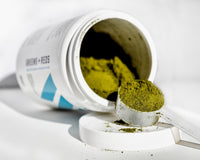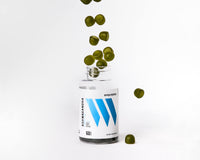Endurance athletes need more fuel than the average gym-goer, in order to perform at a higher level. That fuel is glycogen, which is derived from carbohydrates. Studies have shown for the past several decades, that glycogen replenishment is key to fuel endurance and post-workout recovery during prolonged periods of exercise performance. However, not all carbohydrates are created equal and come in a variety of different forms. The key is to include the right type of carbohydrate at the right time, to get the best possible outcome. Clean carbohydrate sources or complex carbohydrates from real food, provide the long-lasting sustained energy you need for prolonged exercise activity, such as running, cycling, swimming, and high-intensity training. However, the vast majority of carbohydrate supplements are made from genetically modified cornstarch such as dextrose, maltodextrin, and highly branched cyclic (cluster) dextrin, otherwise known as sugar, which provides a quick burst of energy, with little to no nutritional value. We’re going to discuss the key differences between available carbohydrate supplements, to help you determine and understand how to maximize your training and performance.
In this ultimate guide to carbohydrate supplements you will learn
- What Are Carbohydrates?
- Why Carbohydrates Are Important For Athletes
- The Difference Between Simple And Complex Carbohydrates
- The Problem With Most Carbohydrate Supplements
- Why You Need Complex Carbohydrates
- What Are The Benefits Of Carb Supplements?
- What Are The Different Types Of Carbohydrate Supplements?
- Maltodextrin
- Dextrose
- Waxy Maize
- Cyclic Dextrin/Highly Branched Cluster Dextrin
- Karbolyn
- Should You Take A Carb Supplement?
- What’s The Best Carbohydrate Supplement?
What Are Carbohydrates?
Carbohydrates are your bodies' primary source of energy (also known as glucose and stored as glycogen). Glycogen is an easily accessible form of energy. As you exercise, glycogen is utilized as the main fuel source, followed by liver glycogen and blood glucose.
Carbs come in the form of sugars, starches, and fiber. Carbohydrates are broken down in the body by amylase, which is an enzyme that turns carbs into glucose, a fast-acting energy store. If Glycogen is not used as an energy source, it’s stored as body fat, for future energy reserves.
Why Carbohydrates Are Important For Athletes
Glycogen plays a major role in supporting energy demands during pro-longed high-intensity training and moderate exercise. [R]. Depletion of glycogen stores is the main factor in the onset of fatigue during exercise [R]. For rapid recovery from prolonged exercise, it is important to replenish glycogen stores to initiate muscle repair and adaptation [R]. Carbohydrates are utilized within your pre, intra, and post-workout nutrition strategy to influence the restoration of endurance capacity and recovery during high-intensity training [R].
The amount of carbohydrates your body needs depends on the intensity and duration of the activity. The longer the activity and the higher the intensity, the more carbohydrates and glycogen are used as an energy source.
Most endurance athletes train around 65-70% at VO2 max capacity. Muscle glycogen can be depleted within 2 hours of exercise, with liver glycogen depleted with a 15 hour fast. Therefore, consuming an adequate amount of carbs athletes can delay onset muscle fatigue caused by glycogen depletion.

The Difference Between Simple And Complex Carbohydrates
In order to understand the different forms of carbohydrate supplements you must first understand the difference between simple and complex carbohydrates. Each type of carbohydrate supplement is either metabolized and broken down into glycogen at the same rates, and/or provide different qualities and durations of energy.
SIMPLE CARBOHYDRATES
are composed of sugars and can be broken down into two distinct categories– glucose and fructose. Glucose acts as your brain's main energy source and is also known as the sugar in your blood. When you eat foods that are primarily composed of simple carbohydrates your blood sugar rises and your body secretes insulin. The insulin then directs your body to store the glucose in your muscle and liver as glycogen, with excess glucose being stored as body fat. Dextrose, Maltodextrin, Waxy Maize, and Cyclic Dextrin are all considered fast-acting or simple carb supplements, usually ranking very high on the glycemic index.
The Glycemic Index (GI) is a relative ranking of carbohydrate in foods according to how they affect blood glucose levels. Carbohydrates with a low GI value (55 or less) are more slowly digested, absorbed and metabolized and cause a lower and slower rise in blood glucose and, therefore insulin levels. Foods with a high GI are those which are rapidly digested, absorbed and metabolized and result in marked fluctuations in blood sugar (glucose) levels. Low GI carbohydrates – the ones that produce smaller fluctuations in your blood glucose and insulin levels – are one of the secrets to long-term health, reducing your risk of type 2 diabetes and heart disease. It is also one of the keys to maintaining weight loss [R].
RELATED ARTICLE The Short Guide On The Glycemic Index
COMPLEX CARBOHYDRATES
are structured as starch or fiber and digest much slower than simple carbohydrates. Complex carbohydrates are found in whole grains, like oats, legumes, starchy vegetables, and fruit, and which are composed of longer-chained sugar molecules
The difference between starch and fiber is that starch is composed of many sugar molecules and is broken down easily and converted into glucose. Fiber is a bundle of sugar molecules as well but does not spike blood sugar.
The human digestive system cannot break fiber down until it nears the end of the digestive tract and is therefore considered to be a nondigestible carbohydrate. Fibrous foods include bran, nuts, wheat, vegetables, barley, beans, and oats. Complex carbohydrates are better for you because they slow the absorption of sugars, which remove cholesterol and slow down your digestion to keep you fuller for longer. To read more about the specifics between simple and complex carbohydrates read the article below.
RELATED ARTICLE Simple Vs. Complex Carbohydrates
The Problem With Most Carbohydrate Supplements
The problem with the majority of available carbohydrate supplements, is that their made with cheap ingredients, offering suboptimal nutritional value. Supplements like maltodextrin, dextrose, and cluster dextrin are manufactured with genetically modified corn starch, resulting in a highly glycemic carbohydrate source, used for fast-acting energy. Simple carbohydrates spike your insulin levels, which gives you a quick, yet short-lived boost of energy but can attribute to low blood sugar leaving you feeling tired, fatigued, and lethargic. Ever chugged a sugary energy drink, carb supplement, or eaten a snack before a workout or long run and find yourself gassed-out mid-way through your training. This is why.
Most athletes will consume a sugary energy drink an hour or two before their training session, to get that mid-day pick-me-up, when their energy hits a wall. This infuses a vicious cycle, that we call the Blood Sugar Roller Coaster.

When you ingest simple carbs, your body is flooded with an abundance of glucose, surmounting in a short boost of energy, followed by a devastating crash and burn side effect. Once this happens, your body dispels the hormone insulin, to regulate the amount of glucose in your bloodstream. When insulin is released by the pancreas, it disperses the sugar out of your blood into the liver, muscle, and stores it as body fat and glycogen. When the blood sugar is removed, it results in low-blood sugar translating to low energy levels.
This is the reason why you have mood swings, feel hungry all the time, or get fatigued and have low energy. Insulin levels and blood sugar all depend on the type of carbohydrates you consume. Understanding the different types of carbohydrates, will allow you to implement and supplement the right type, at the right time, to optimize your performance and training, and minimize burnout side effects.
The Best Carb Supplements
Complex carbs or clean carbs, digest much slower than simple carbohydrates due to their longer-chain molecular structure. Complex carbs are also sugars, but they do not spike blood insulin, keeping your blood glucose levels stable, providing a long-sustained energy release. These types of carbohydrates, work best for prolonged training, improving endurance, building more muscle mass, and optimizing body composition. Complex carbs slow the absorption of sugar, slowing down digestion, which results in lower cholesterol levels and keeping you fuller for a longer period of time. When you ingest complex carbohydrates, there is no blood sugar roller coaster, of highs and lows. Energy is gradual and sustained over time.

Having complex carbohydrates in supplement form, can ensure you have enough glycogen stored, to get through grueling WODs, or competitions, with more sustained energy and less muscle fatigue. However, it’s hard to find complex carbohydrates in an easily digestible and convenient form, to be used intra workout. That’s why we created Clean Carbs.
RELATED ARTICLE Post Workout Carbs: Should You Take A Carb Supplement?
Swolverine's Clean Carbs® is made with 100% real whole-superfoods from complex carbohydrates, including Sweet potatoes, Yams, Oats, and Blueberries. These four ingredients provide the long-lasting and sustained energy your body needs to fuel performance and optimize recovery. It’s the best carbohydrate supplement to drink pre and intra workout during competition or on race day.
 What Are the Benefits Of Complex Carb Supplements?
What Are the Benefits Of Complex Carb Supplements?
Carb Supplement Benefits: Improves Energy & Fuels Endurance

Glycogen is the main fuel source for normal brain function and provides your body with energy, by generating adenosine triphosphate (ATP). If you don’t eat enough carbohydrates, you can feel tired, lethargic, lose mental focus, and slow mental processing. Not to mention, insufficient carb intake, will interrupt athletic performance since you’ll have less energy to be physically active. Complex carb supplements will help prolong exercise performance and fuel muscle endurance.
Your body naturally depletes glycogen stores during intense physical training and is the main factor in the onset of fatigue. Numerous clinical studies have proven that prolonged exercise correlates with low glycogen muscle content [R]. During intense, intermittent exercise, and throughout prolonged physical activity, glucose is oxidized through aerobic and anaerobic exercise to produce ATP, which is required for muscle contraction. Glycogen is depleted at the rate of physical activity. As a result, high-intensity training will deplete glycogen stores quicker, than moderate-intensity exercise [R].
According to the Journal Of Sports Medicine “During exercise at intensities greater than approximately 60% maximal oxygen consumption (VO2max), blood glucose and muscle glycogen are the primary fuels oxidized to produce the ATP required to sustain exercise, in large part because more fast-twitch motor units are recruited as exercise intensity increases, increasing the reliance on carbohydrate as the predominant fuel source [R].
Carb Supplement Benefits: Optimizes Workout Recovery

As you know, high-intensity exercise will deplete glycogen stores. With low glycogen, you’ll have less energy, and essentially less fuel to perform subsequent training sessions and workouts. Studies have shown that Glycogen repletion immediately after exercise, paired with protein will induce greater changes in muscle mass as well as promote faster muscle recovery [R].
Carb Supplement Benefits: Builds More Muscle Mass

When it comes to building muscle protein gets all the glory. However, you’ll need complex carbohydrates in addition to protein, in order to gain more muscle and strength. Getting the proper and adequate amounts of essential amino acids from protein and glycogen from carbohydrates is crucial for post-workout nutrition, in order to replenish and initiate the repair process to optimize your training and build more muscle.
Clinical studies have shown that including carbohydrates and protein together into your post-workout nutrition has the greatest benefits on performance optimization and muscle growth [R].
RELATED ARTICLE Post Workout Nutrition: What Should I Eat After My Workout For The Best Results?
What Are The Different Types Of Simple Carbohydrate Supplements?
Maltodextrin
Maltodextrin is made from rice, potato starch, or wheat, yet is usually manufactured from genetically modified (GMO) corn. It’s a highly processed food additive, which is very similar to corn syrup and commonly used as a thickening agent or filler.
Maltodextrin is very high on the Glyemic Index, therefore Athletes with diabetes should be pay particularly close attention, if and when introducing this type of supplement within their supplement regimen. Supplements like maltodextrin are considered a suboptimal source of nutrition and have no nutritional value. Yet, despite the negative drawbacks of maltodextrin, it can provide the quick burst of energy you need on race day.
As a sports supplement, Maltodextrin is used for an energy boost, weight gainer, or for nutrient transport regarding post-workout recovery when combined with protein. Endurance athletes such as triathletes, often use energy gels or wafers made with maltodextrin to fuel intense exercise activity on race day. This type of supplement is used in addition to complex carbohydrates, to increase glycogen stores for energy reserves and muscle fuel.
RELATED ARTICLE Carb Loading: The Best Strategy For Endurance Athletes To Crush The Competition
Dextrose
Dextrose is also made from modified corn starch and is chemically identical to glucose or sugar. Like maltodextrin, dextrose is rapidly digested, providing a quick burst of energy and can be utilized by endurance athletes on race day as part of their nutrition/supplement strategy. Like we talked about earlier, when blood sugar levels rise, your body releases large amount of insulin dispel blood sugar from the bloodstream. This can have a negative impact on performance, since it can leave you feeling lethargic and fatigued, followed by an energy crash. This is why it’s important to have a nutrition strategy, with additional complex carbohydrates, if and when you use simple carbohydrates as an ergogenic aid.
Waxy Maize
Waxy maize is a slow-digesting carbohydrate, made from various sources such as rice, barley, and corn. Waxy maize is specifically classified as a starch. Yet despite this classification as a slower digesting carbohydrate source, several studies have shown that waxy maize provides no better performance outcomes than dextrose or maltodextrin [R].
Cyclic Dextrin/Highly Branched Cluster Dextrin
Cyclic Dextrin also referred to, as Highly Branched Cluster Dextrin (HBCD) is a type of high-molecular-weight maltodextrin. Dextrins are produced from applying a branching enzyme to cornstarch. The branching enzyme works on the joint of the cluster structure of amylopectin and degrades it by cyclization [R]. In addition to being used as a sports performance product, HBCD is also used as a taste masking improver and a spray drying aid.
Cluster Dextrin, like other carb supplements such as dextrose and maltodextrin are meant to provide fast-acting energy, for intense periods of exercise. Studies show that cluster dextrin provides the same performance outcomes as other carbohydrate supplements, despite its huge price tag.
RELATED ARTICLE 3 Reasons Why You Shouldn’t Use Highly Branched Cluser Dextrin, Dextrose, or Maltodextrin
HBCD claims that it’s the "fastest absorbing" carbohydrate and that it prevents various digestive problems often found with other carb supplements such as maltodextrin and dextrose. Fast absorption is often regarded as a positive benefit to endurance athletes so that they can retain a quick rush of energy during training and competition. Manufacturers of HBCD claim that its increased molecular weight and decreased osmolarity due to its unique branched structure causes it to be digested and absorbed rapidly and sent to muscle tissue quickly.
That sounds great, however, clinical studies suggest that HBCD actually hangs around in the stomach longer than other, far cheaper carb supplements [R]. Not only that but when tested against both maltodextrin and glucose, HBCD showed no differences in perceived exertion and produced no additional blood glucose for glycogen replenishment.
Based on the clinical research, Highly Branched Cyclic Dextrin
- Has not been shown to increase exercise performance in humans when tested against other fast-acting carb supplements
- Does not replenish glycogen better than other fast-acting simple carb supplements
- Empties from the stomach slower than maltodextrin, but faster than glucose
- Shows no better benefit in human performance during exercise compared to other fast-acting carb supplements
- Shows no benefit to rate of perceived exertion during exercise, when compared to other fast-acting carb supplements
- Weak test results showed that at only one time point, (of multiple that were tested), in one study, in rodents, showed a performance increase.
Karbolyn
Karbolyn is a homopolysaccharide derived from potato, rice, and corn. Manufacturers claim that Karbolyn is absorbed like a simple sugar, but without the typical crash associated with other simple carbohydrate supplements, providing long-lasting sustained energy levels. Karbolyn was created for the specific purpose of carb loading. It was designed to give elite or endurance athletes a more optimized way of improving glycogen stores. Karbolyn passes through the digestive tract rapidly, acting like a pump pulling water and nutrients along with it. Although the benefits of rapid absorption and long-lasting sustained energy sound good, unfortunately, there are no clinical studies that show that Karbolyn is a superior ergogenic aid, or that it provides better performance outcomes to coincide with manufacturer claims.
Should You Take A Carb Supplement?
Now that you know the differences between simple and complex carbohydrates, and how carbohydrates work, the question is, should you take a carb supplement?
Yes. If You’re An Endurance Athlete
If you’re an endurance athlete and require a larger amount of carbohydrates in your diet, then yes you should absolutely be taking a pre, intra workout, supplement or post-workout carb. Of course, you’ll get most of your carbohydrates through food, however, in times of glycogen depletion with intense physical exercise supplementation is advised for optimal performance and recovery. According to clinical research regarding muscle glycogen synthesis, for optimal training performance, muscle glycogen stores must be replenished on a daily basis. For the average endurance athlete, a daily carbohydrate consumption of 500 to 600g is required. This results in maximum glycogen storage of 80 to 100 mmol/g wet weight [R].
For the average workerouter, carb supplements may not be necessary. Adding a carbohydrate supplement depends on your training, training intensity, duration, and nutrition protocol. If you’re not sure if you need a carbohydrate supplement or not, you can get supplement and nutrition advice from our certified nutrition coaches at The Swole Kitchen.![]()
Yes. If You’re Trying To Gain Strength And Meet Your Macronutrient Goals
When you’re trying to gain more muscle mass and strength, your body needs more high-quality sources of carbohydrates. Complex carbohydrates are easily digested and provide a slow release of insulin, helping with performance and body composition as compared to simple carbs [R]. Carbohydrate supplements can help you meet your daily macros with a clean source of carbs so you stay on track and build more muscle mass and strength.

Protein is the superstar macronutrient when it comes to building muscle mass. But without an adequate amount of complex carbohydrates, your body won't be able to adequately repair and rebuild muscle mass, deriving suboptimal results.
What’s The Best Carb Supplement?
Swolverine’s Clean Carbs® is a carbohydrate powder supplement made from real food such as sweet potatoes, yams, oats, and blueberries, which are the preferred and natural carb fuel source to provide long-lasting sustained energy, without spiking blood insulin levels and creating more body fat.
Carb supplements such as HBCD, waxy maize, maltodextrin, and dextrose have no clinical evidence showing that they increase human performance when tested against other natural carb supplements. The other problem with most carb supplements is that they increase blood glucose levels and spike insulin production, which increases energy levels, followed by a rapid dip, similar to a roller coaster, and causes an energy crash and fatigue.
SWOLVERINE IS AN ENDURANCE ATHLETE AND ACTIVE LIFESTYLE BRAND. MADE FOR THE ELITE ATHLETE, AND THE STRONG-WILLED OUR PRODUCTS WERE DESIGNED TO FUEL YOUR ATHLETIC PERFORMANCE. WE PERFORM WHEN YOU PERFORM.
We believe that everyone can optimize not only their athletic performance but their human potential. The way we believe we can optimize performance is through transparency, clinically effective doses, and clinically proven ingredients with evidence-based outcomes. We provide the nutrients you need to power your active lifestyle.
References
Goodpaster BH, Costill DL, Fink WJ, Trappe TA, Jozsi AC, Starling RD, Trappe SW. The effects of pre-exercise starch ingestion on endurance performance. Int J Sports Med. 1996 Jul;17(5):366-72.
Takahashi, Yumiko et al. “Effects of Nutrient Intake Timing on Post-Exercise Glycogen Accumulation and its Related Signaling Pathways in Mouse Skeletal Muscle.” Nutrients vol. 11,11 2555. 23 Oct. 2019, doi:10.3390/nu11112555
Sedlock DA. The latest on carbohydrate loading: a practical approach. Curr Sports Med Rep. 2008;7(4):209-13.
Hawley JA, Schabort EJ, Noakes TD, Dennis SC. Carbohydrate-loading and exercise performance. An update. Sports Med. 1997;24(2):73-81.
Åkermark, C., Jacobs, I., Rasmusson, M., & Karlsson, J. (1996). Diet and muscle glycogen concentration in relation to physical performance in swedish elite ice hockey players.
International Journal of Sport Nutrition and Exercise Metabolism, 6(3), 272-284. Retrieved from SCOPUS database. Burke, L. M. (2007). Nutrition strategies for the marathon: Fuel for training and racing. Sports Medicine, 37(4-5), 344-347. Retrieved from SCOPUS database.
Chen, Y., Wong, S. H. S., Xu, X., Hao, X., Wong, C. K., & Lam, C. W. (2008). Effect of CHO loading patterns on running performance. International Journal of Sports Medicine, 29(7), 598-606. Retrieved from SCOPUS database.
Hatfield, D. L., Kraemer, W. J., Volek, J. S., Rubin, M. R., Grebien, B., Gómez, A.L., et al. (2006). The effects of carbohydrate loading on repetitive jump squat power performance. Journal of Strength and Conditioning Research, 20(1), 167-171. Retrieved from SCOPUS database.
Ivy JL. Muscle glycogen synthesis before and after exercise. Sports Med. 1991;11(1):6-19.
Friedman JE, Neufer PD, Dohm GL. Regulation of glycogen resynthesis following exercise. Dietary considerations. Sports Med. 1991;11(4):232-43.
Adeva-Andany, María M et al. “Glycogen metabolism in humans.” BBA clinicalvol. 5 85-100. 27 Feb. 2016, doi:10.1016/j.bbacli.2016.02.001
Webber, Joel, and Mike Zimmerman. The Men's Health Big Book of Food & Nutrition: Your completely delicious guide to eating well, looking great, and staying lean for life! Rodale, 2012.
Murray, Bob, and Christine Rosenbloom. “Fundamentals of glycogen metabolism for coaches and athletes.” Nutrition reviews vol. 76,4 (2018): 243-259. doi:10.1093/nutrit/nuy001
Hawley JA, Leckey JJ. Carbohydrate Dependence During Prolonged, Intense Endurance Exercise. Sports Med. 2015;45 Suppl 1:S5-12.
Ferretti, Fabrizio, and Michele Mariani. “Simple vs. Complex Carbohydrate Dietary Patterns and the Global Overweight and Obesity Pandemic.” International journal of environmental research and public health vol. 14,10 1174. 4 Oct. 2017, doi:10.3390/ijerph14101174
H Takii, et al. “Enhancement of swimming endurance in mice by highly branched cyclic dextrin.” I. 1999 Dec;63(12):2045-52
T. Furuyashiki, et al. “Effects of ingesting highly branched cyclic dextrin during endurance exercise on rating of perceived exertion and blood components associated with energy metabolism.” Biosci Biotechnol Biochem. 2014;78(12):2117-9. doi: 10.1080/09168451.2014.943654
K. Suzuki, et al. “Effect of a sports drink based on highly-branched cyclic dextrin on cytokine responses to exhaustive endurance exercise.” Sports Med Phys Fitness. 2014 Oct;54(5):622-30.
H Takii, et al. “Fluids Containing a Highly Branched Cyclic Dextrin Influence the Gastric Emptying Rate,” Int J Sports Med 2005; 26: 314-319.
H. Takii et al, “A Sports Drink Based on Highly Branched Cyclic Dextrin Generates Few Gastrointestinal Disorders in Untrained Men During Bicycle Exercise.” Food Sci. Technol. Res., 10 (4), 428-431, 2004


 What Are the Benefits Of Complex Carb Supplements?
What Are the Benefits Of Complex Carb Supplements?










